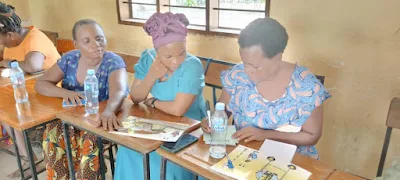By Deogratius Koyanga, Kibaha
The existence of traditional dances that young girls play in
the Pwani region has contributed to the existence of early marriage and
pregnancy and has prevented girls from reaching their goals, including becoming
leaders in the community.
 |
| Pangani Ward in Kibaha Town Council leaders and Participatory Action Research (PAR) |
Speaking during a ward-level feedback session on the
participatory action research (PAR) conducted by Tanzania Gender Networking
Programme (TGNP), for ward leaders at Pangani ward, Kibaha Town Council, in Pwani
Region, the ward councillor, Augustino Mdachi, said that teenage pregnancy is
caused to a large extent by the presence of customs and traditions that lead to
children being exposed to risky environments.
The councillor also said that another reason is the walking distance
to secondary school education, as girls have to walk long distances from the Vikawe
streets to Kidimu Secondary School, which is located in the ward headquarters.
 |
| Participants presented the key issues through the ward map. |
The participatory action research, which involves
community-based research, was conducted by the Tanzania Gender Network (TGNP),
as part of the implementation of the project to empower the voices of women,
girls and people with disabilities in leadership and the right to own resources,
funded by UNWomen in the council.
TGNP and UNWomen are working with the Kibaha Town Council to
build capacity for the community to change attitudes, customs and traditions
that contribute to women, girls and people with disabilities being unable to
participate in leadership and decision-making positions at various levels and
to look at the challenges that contribute to this group not owning resources.
"The distance problem is the source of these childhood
pregnancies, which contribute to a large extent to girls losing their dream of
getting an education and becoming tomorrow's leaders. For example, girls who
walk the entire distance from Vikawe to Kidimu are a major problem and can lead
to pregnancy. We are continuing with the process, we have already started the
process of getting another secondary school in Vikawe to solve this
problem."
 |
| Findings presented through the Poem |
The PAR participants also proposed that if parents protect
their daughters by preventing them from participating in traditional dances,
and ensuring that only those who have reached the age of adolescence and
adulthood are involved in traditional dances like ‘Unyago’, the problem of
teenage pregnancy will end. They also proposed that girls who are involved in ‘unyago’ dances should not be released from
inside with their chests exposed, as this humiliates them and makes them lose
the courage to be leaders or to stand in front of people.
 |
| Cartoons and pictures were used to provoke debate among the Participants |
The Vikawe Street chairperson, Anas Bwanari, said that teenage
pregnancy is a major problem in his street, and the reasons he sees are due to
marital conflicts, the existence of divorce, where children are raised by one
parent or by foster parents who also abused them sexually.
"….. sexual violence prevents women from achieving
their goals, including owning resources, benefiting from existing resources and
becoming good leaders of tomorrow. We recommend the existence of self-awareness
education for the entire community, to eliminate the problem of teenage
pregnancy, but also to reduce sexual violence against women."
Earlier, giving details about the feedback exercise that
took place, the PAR facilitator from TGNP, Deogratius Temba, said that after
leading the community to conduct participatory action research, various issues
have been identified and ranked in priorities, where the issue of irresponsible
leadership, teenage pregnancy and oppressive customs and traditions were seen
as the reason why women, girls and people with disabilities are unable to
participate fully in leadership and decision-making positions and also in
resource ownership.
Participatory action research (PAR), conducted by TGNP aims to build
communities from an gender analytical perspective by identifying opportunities
and challenges that surround them, analyzing the obvious causes, and the root
causes of the problem, and setting up action plans to implement or make
recommendations for solving the problem.
It is a concept used to change communities from a
perspective of relying on the government to do everything and making
communities propose their solutions using the resources surrounding them in
collaboration with leaders. It also removes conflicts between communities and
their leaders.
 |
| Drama |






















No comments:
Post a Comment